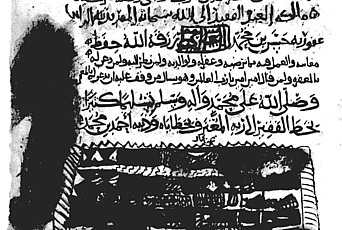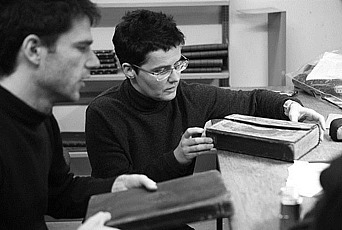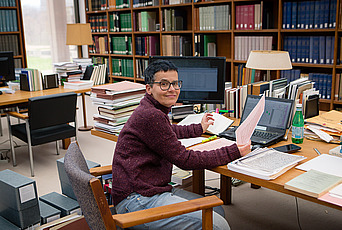53 Additional Manuscripts from Bavarian State Library Caprotti/Glaser Collection Available Online
Press Contact
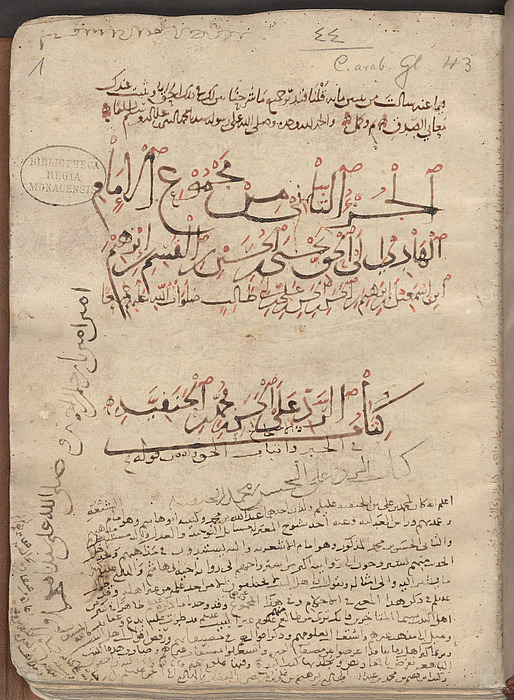
The Institute for Advanced Study, the Hill Museum & Manuscript Library (HMML), and the Bayerische Staatsbibliothek, Munich, announce that digital copies of 53 additional South Arabian manuscripts are now available online through vHMML (Virtual HMML) Reading Room and the digital repository of the Bavarian State Library. Convenient access is further provided through the Digital Portal of the Zaydi Manuscript Tradition website at the Institute for Advanced Study, Princeton, New Jersey. The digitization has been generously funded by the National Endowment of the Humanities.
The South Arabian manuscripts held by the Bavarian State Library were brought together by the Italian merchant Giuseppe Caprotti, who arrived in Yemen in 1885 and spent the next 34 years there. During his sojourn in South Arabia, Caprotti collected 1,790 manuscripts. A small portion, 157 manuscripts, was offered in 1901 through the mediation of Eduard Glaser to the Bibliotheca Regia Monacensis at Munich (now Bavarian State Library), and the purchase was concluded in 1902. The bulk of the Caprotti collection belongs, since 1909, to the Biblioteca Pinacoteca Accademia Ambrosiana, in Milan, and another portion of 280 manuscripts was donated in 1922 to the Biblioteca Apostolica Vaticana.
“With close to 1,800 codices, the Caprotti collection is the largest collection of South Arabian manuscripts outside Yemen, and it is very helpful that some more of this precious material is now available to scholars worldwide in digital form,” said Sabine Schmidtke, Professor of Islamic intellectual history in the School of Historical Studies at the Institute for Advanced Study.
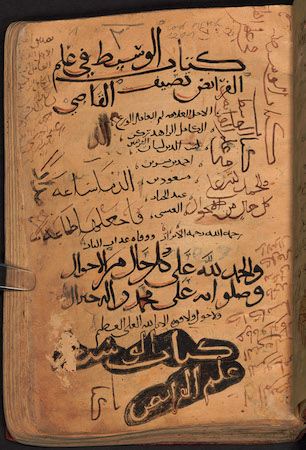
The majority of the 53 codices were transcribed during the 17th century; the collection also includes some codices that date back to the 13th century, as well as manuscripts that were copied during the second half of the 19th century, i.e. shortly before the collection was sent off to Europe. The entire Munich collection of South Arabian manuscripts, which includes a fair number of holographs and unica, is described in detail by Florian Sobieroj in his Arabische Handschriften der Bayerischen Staatsbibliothek zu München unter Einschluss einiger türkischer und persischer Handschriften, Band 1 (Stuttgart, 2007).
The IAS and the Bayerische Staatsbibliothek are currently preparing the digitization of the remaining 70 codices of the Munich Caprotti collection, which will be concluded towards the end of 2020.
HMML began its collaboration with the IAS in April 2017. The two organizations are providing open access to approximately 15,000 digitized Zaydi manuscripts from Yemen and neighboring countries. The Zaydi literary tradition is among the richest and most variegated traditions within Islamic civilization and, at the same time, one of the least studied. Zaydi scholars produced manuscripts for over one thousand years, covering a wide spectrum of traditional disciplines. The project will help support and make accessible the Zaydi handwritten heritage—a heritage that is on the verge of destruction in Yemen.
“HMML is delighted with the continued growth of the ZMT collections and proud to be providing online access to this underrepresented tradition of Islamic thought. The collaboration strengthens our commitment to preserving and sharing Islamic manuscript heritage, as we have done with libraries in Jerusalem, the manuscripts of Timbuktu, and collections in South and Southeast Asia,” said Fr. Columba Stewart, HMML’s executive director and a former IAS Member (2016–17).
For further information about the HMML, visit www.hmml.org, or call (320) 363-3514.
For the IAS, visit www.ias.edu/about, or call (609) 734-8000.
And for the Bayerische Staatsbibliothek, visit www.bsb-muenchen.de, or call +49 89 28638-2477.
About Hill Museum & Manuscript Library
HMML is a global organization committed to advancing manuscript research and scholarly inquiry by digitally preserving, providing access to, and interpreting manuscript collections from around the world. HMML prioritizes manuscripts from regions endangered by war, political instability, and other threats.
About the Institute
The Institute for Advanced Study is one of the world’s foremost centers for theoretical research and intellectual inquiry. Located in Princeton, N.J., the IAS is dedicated to independent study across the sciences and humanities. Founded in 1930 with the motto “Truth and Beauty,” the Institute is devoted to advancing the frontiers of knowledge without concern for immediate application. From founding IAS Professor Albert Einstein to the foremost thinkers of today, the IAS enables bold, nonconformist, field-leading research that provides long-term utility and new technologies, leading to innovation and enrichment of society in unexpected ways.
Each year, the Institute welcomes more than 200 of the world’s most promising researchers and scholars who are selected and mentored by a permanent Faculty, each of whom are preeminent leaders in their fields. Of the Institute’s current Faculty of twenty-six, two are Fields Medalists and five are MacArthur “Genius” Fellows. Comprised of four Schools—Historical Studies, Mathematics, Natural Sciences, and Social Science—IAS has produced an astounding record of introducing new understanding and is responsible for undeniable progress across disciplines and generations, from the development of one of the first stored-program computers to the establishment of art history as a discipline in the United States. Among its present and past Faculty and Members are 34 Nobel Laureates, 42 of the 60 Fields Medalists, and 18 of the 20 Abel Prize Laureates, as well as many MacArthur Fellows and Wolf Prize winners.
About Bayerische Staatsbibliothek
The collection of manuscripts held by the Bayerische Staatsbibliothek is one of the most extensive and most important of its kind: Over 41,000 Occidental and 20,000 Oriental or Asian manuscripts, around 70,000 music manuscripts, around 1,100 sets of modern papers and over 36,000 autographs secure a place for the Bayerische Staatsbibliothek among the top libraries of the world.
Manuscripts from the Middle East have been an important, continuously expanded part of the collection since the foundation of the Munich court library. Today, the library holds around 5,400 volumes, for example Arabic, Turkish or Hebrew manuscripts, but also smaller groups in the Armenian or Syrian languages.
The collection of Codices arabici (Cod.arab. 1–2852) currently encompasses over 3,100 volumes, thus representing the largest collection group among works from the Middle East. Their period of creation reaches from the 9th to the 19th century.
